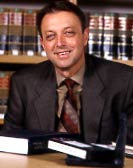Scott: 30 Years Collaborating with Students
 |
From the moment he stepped on “stage” at William and Mary Law School, Bob Scott knew that he was meant to teach. He could at once bring to students the enthusiasm with which he researched his ideas about the law while revealing a side of him that introverts rarely find a chance to do.
“It’s fair to say that there is a bit of a performer in me, as there is in many teachers,” he says. “It’s not a well known fact, but most law professors are somewhat shy and introverted and I’m no exception. You enjoy those environments where you are permitted to show parts of your personality that might not emerge in other settings.”
Fortunately for the University of Virginia, several years later Scott brought his teaching skills to the Law School. In just a few years, he would make his mark internationally as one of the founding scholars of the Law and Economics movement (see accompanying article), but his skill here at the lectern was evident from the beginning. A perennial favorite with students, Scott’s teaching success comes from his intuitive ability to gauge the depth of his students’ grasp of the issues, and to bring them along accordingly with a carefully calibrated Socratic approach. “The important part about law teaching is to remember that your students are learning a skill by observation as much as by participation,” he says. “Only by imagining that you are in the middle of that dialogue—even though you are not being called on at that point—can you practice those skills yourself. This means that the teacher must hold the attention of the entire class even while engaging only a single student in discussion.”
Scott tells his students at the beginning of every new class that theirs is a collaborative exercise where he needs to ask good questions to elicit from them intelligent answers. “I use the tennis pro metaphor,” he says. “If I didn’t know how to play tennis, I would take a lesson from a pro, but if he is hitting forehands and backhands into the corners of the court where I couldn’t possibly reach and some friends came along, they wouldn’t say that I can’t play tennis. They would say, you need to get another pro. So clearly, the professor has to be skilled at asking questions that elicit the right kinds of responses and then be able to adjust his or her questions to the student’s responses to make the discussion progress.”
When Scott’s class responds to his efforts, Scott feels a “sense of excitement that builds collectively when they reach for and then achieve insight and understanding … I have never gotten over the high of observing and participating in that awakening of students.” But when a class founders, and fortunately that is not often, Scott takes it personally. He prepares diligently, but nevertheless, at times Scott walks into his office after a bad class and “I put my head down on my desk and pound the desk in frustration at how poorly I’ve done. But I think that when I can show them that this is an important effort for me and that I’m trying as hard as they are to reach a resolution that everybody understands and appreciates, it makes them feel a little better about the experience.”
Scott feels he is part of a strong teaching tradition at the Law School, distinguished for the way it brings together faculty scholarship and the classroom experience. “We teach what we write, and we write what we teach,” he says, and he has always used the classroom as a laboratory for his ideas about law. “As I work through my ideas about Contracts or Commercial Law, I try them out on my students. I’ve always thought that if I can’t persuade my students that my scholarly arguments have currency, that they are a useful way of thinking about whatever the problem is, I’m certainly not going to be able to persuade my academic colleagues when I write a law review article about it.” For Scott, receiving the Harrison Chair has special significance. “It’s an important affirmation of my colleagues’ faith in my ability to be a contributing member of the academic community for years to come. Second, it’s important because of my very close and long-standing relationship with David Harrison and his family.
“We became friends almost from the moment I became Dean—good friends—and he was a remarkable man. His decision to invest in the Law School—and that’s exactly what it was, as he was an investment banker—was not a quick one. It was not done simply because he had a lot of money and was a graduate of the Law School. David was very strong in his judgments, interested in other people, interested in ideas, interested in quality. By the time he retired, he had accumulated a lot of wisdom and judgment. He was a no nonsense person. I came to realize that he was getting to know me and that it was an evaluative process. He was deciding if this was someone whose management he could trust in making his investment.”
Clearly, given David Harrison’s generosity toward the Law School, he learned to trust Bob Scott completely. In that regard he was not unlike the generations of Virginia students who have trusted and admired him as a master teacher.




